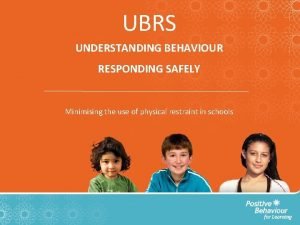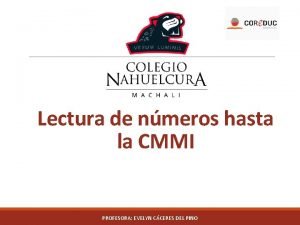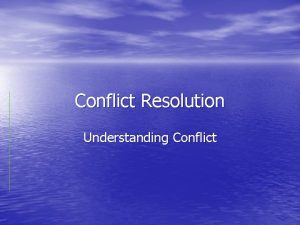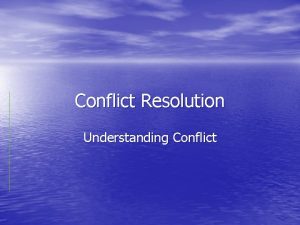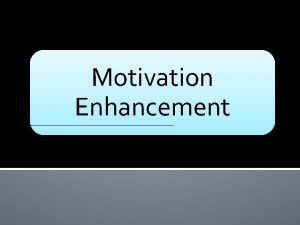MINISTRY ENHANCEMENT SERIES UNDERSTANDING RESPONDING TO CONFLICT CMI




- Slides: 4

MINISTRY ENHANCEMENT SERIES…. . UNDERSTANDING & RESPONDING TO CONFLICT © CMI Vocational Training This manual has been designed to facilitate “professional conversations”, where users are encouraged to explore the area of understanding and responding to conflict in relation to their own church experiences. Many books have been written about the area from experts around the world. This manual is not an “expert” account of the area, but a manual to encourage the user to consider the area of conflict holistically and explore what each component means in their context. The area of church conflict can be very distressing for those impacted as primary, secondary and tertiary stakeholders. The level of distress resulting from church conflict can tempt stakeholders and those charged with addressing church conflict on a local church level as well as on a church organisation level to move straight to resolution stage. As any organisational conflict can be very complex, moving quickly to a “fix it” stage can at times become counter-productive. For example, if there is no attempt to try to understand the conflict and how things have arrived at a particular point before moving to attempts to resolve the conflict, it could be like putting a dressing on a dirty wound. As the user works through each section of the manual, they will have the opportunity to unpack each component and come to a point of understanding of the area of church conflict, before considering how conflict in their church context may be addressed. This manual may be used by individuals as they explore this area in isolation or by groups of clergy or church leaders. Users are encouraged to work through the manual with the focus on the “journey” as opposed to the “destination” and take time to reflect on how the subject might apply to their church context both from a reactive as well as preventative perspective. ~ Celia Irving

OVERVIEW OF THE MANUAL 1. EXPLORING CONFLICT a. b. c. Reflections on conflict Learnings from conflict Why do we have conflict? 2. WHERE DOES CONFLICT COME FROM? a. b. c. d. e. f. g. h. i. j. k. l. m. n. o. 3. The nature of conflict Unmet expectations Unique perception Lack of shared meaning of concepts Poor accountability structures Lack of adequate supervision Lack of respecting boundaries of others Different perspectives of church Unresolved past issues and moving through levels of conflict Beliefs around use of power and decision-making Communication barriers and misunderstandings Communication styles and behavioural choices Shadow side of communication Unmanaged polarities Bullying behaviours FACTORS THAT IMPACT CONFLICT a. b. c. d. e. f. g. h. i. j. k. Power of clergy Criticism in parish life Impact of stress on responding to conflict Managing polarities Identifying tension points in preferences and priorities Intensity of conflict Personal approaches to conflict Habits in conflict The willingness to extend grace Personal reactions to being in conflict Unhelpful behaviours

4. PREPARING FOR CONFLICT a. Basic ingredients to prepare for conflict b. Developing a culture of good health c. Establishing clarity around roles, responsibilities and authority of clergy and laity d. Teaching on conflict e. Some common conflict triggers in church life f. Developing Team Covenants g. Preparing for difficult conversations h. The role of scripts in preparing for conflict i. Identifying, equipping and empowering the peacemakers in the congregation j. Building resilience in a congregation 5. IN THE MIDST OF CONFLICT a. Pushing the “Pause Button” b. Minimizing damage from conflict c. Clergy factors as a source of conflict d. Clergy factors in a conflict e. Growing out of conflict f. What questions should we be asking? 6. SOME SCRIPTURAL APPROACHES TO RESOLVING CONFLICT a. Resolution of conflict within a Christian context b. Rick Warren c. Peacemakers d. Agreeing and Disagreeing in Love e. Jesus Principles - A Christ-like approach to addressing conflict f. The place of Matthew 18 7. ADDRESSING CONFLICT SAFELY a. When and how to engage the “Pause Button” b. Determining the extent of the “Ripple Effect” c. Determining the actual problem d. Achieving the appropriate level of oxygen e. Consider when a change in thinking may be helpful f. The role of communication to stakeholders when addressing conflict g. The role of church hierarchy when addressing conflict h. External care and support systems when addressing conflict i. Gathering and interpreting the right information j. A process for addressing conflict k. Engaging in difficult conversations l. Using scripts in difficult conversations

m. Types of meetings to address conflict n. Conflict coaching to prepare for meetings o. Responding to conflict with the assistance of a facilitator or mediator p. Work, Health and Safety Legislation and conflict q. Accepting when conflict can’t be resolved r. Communication competence in addressing conflict 8. MAPPING A CONFLICT a. What is a conflict map? b. How to map a conflict 9. MONITORING AND REVIEWING CONFLICT STATUS a. Monitoring the calm after the storm – has the conflict been resolved? b. Identifying the casualties of the conflict c. Identifying when adjustments need to be made d. Identifying when to push the “Pause Button” again 10. RECOVERY FROM CHURCH CONFLICT a. When does the recovery period commence? b. How long does it take to recover after a church conflict? c. Determining what would recovery would look like d. Communication during the recovery period e. Drawing upon the appropriate resources to assist in recovery f. Everyone as an Agent of Healing g. Employing resilience factors in recovery h. When recovery from church conflict isn’t possible i. Celebrating recovery The manual is also available as part of a two day workshop presented by Celia, entitled Understanding & Responding to Conflict. For information about the two day workshop, contact Celia at cmivoctraining@gmail. com The contents of this manual have been mapped to the following units of competency from national training packages: PSPGEN 021 - Contribute to Conflict Management – Public Sector Training Package PSPGEN 032 – Deal with Conflict - Community Services Training Package BSBATSIL 503 – Manage Conflict - National Business Services Training Package
